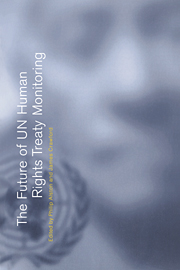Book contents
- Frontmatter
- Contents
- List of Tables, Figure, Appendices
- Notes on Contributors
- Editors' Preface
- Table of Treaties
- Table of Cases
- List of Abbreviations
- 1 The UN human rights treaty system: A system in crisis?
- A The UN human rights monitoring system in action
- B National influences and responses
- C Regional and sectoral comparisons
- 15 Reporting in the Inter-American system of human rights protection
- 16 Lessons from the reporting system of the European Social Charter
- 17 The role of reporting in international environmental treaties: Lessons for human rights supervision
- D Common challenges for the treaty bodies
- E Looking to the future
- Index
16 - Lessons from the reporting system of the European Social Charter
Published online by Cambridge University Press: 23 December 2009
- Frontmatter
- Contents
- List of Tables, Figure, Appendices
- Notes on Contributors
- Editors' Preface
- Table of Treaties
- Table of Cases
- List of Abbreviations
- 1 The UN human rights treaty system: A system in crisis?
- A The UN human rights monitoring system in action
- B National influences and responses
- C Regional and sectoral comparisons
- 15 Reporting in the Inter-American system of human rights protection
- 16 Lessons from the reporting system of the European Social Charter
- 17 The role of reporting in international environmental treaties: Lessons for human rights supervision
- D Common challenges for the treaty bodies
- E Looking to the future
- Index
Summary
The object of this chapter is to reflect upon the reporting system for the European Social Charter (ESC) with a view to considering what lessons it may have for the reporting systems that operate under UN human rights treaties. This is not to suggest that the reporting system under the ESC is perfect or that, given its regional nature, it provides a good analogy in all respects for its UN equivalents. It is rather that the ESC reporting system is a well established system that has in some respects developed along different lines from those of UN reporting systems, and that some of its good features may be transferable to the universal level.
Reports
The ESC requires contracting parties (of whom there are currently twenty five) to submit periodic national reports relating to all of the ESC provisions they have accepted. The first parties to the Charter have now reported for thirty years.
The system works well in the sense that, although reports are commonly some months late and the information provided is not always complete, there has never been a case of a state not submitting a report. Consequently, the Council of Europe has never been faced with anything like the problem that regularly faces UN treaty monitoring bodies of reports being many years overdue.
There are several reasons for the good reporting record of states under the ESC. The European states concerned are generally better equipped administratively and financially to prepare national reports and have greater experience of doing so than many developing states.
- Type
- Chapter
- Information
- The Future of UN Human Rights Treaty Monitoring , pp. 347 - 360Publisher: Cambridge University PressPrint publication year: 2000
- 1
- Cited by

